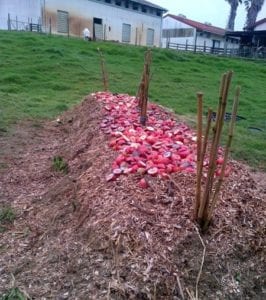Picture: A static compost heap on the Welgevallen Experimental Farm in Stellenbosch. (Photo: Dr Elmi Lötze)
Wanted: school hostels, feeding schemes, or community gardens in the Boland that want to dispose of their large volumes of garden refuse or leftover food in a “green” way, and in addition also wish to reap the economic rewards of their efforts. Agricultural researchers at Stellenbosch University (SU) are willing to assist in these endeavors, as they are currently evaluating various methods to produce compost in large quantities. So says Dr Elmi Lötze, a researcher from Hortgro who is seconded to the SU Department of Horticultural Science. The initiative forms part of a project she managed with SU colleagues Martin Wilding and Willem van Kerwel of the Welgevallen Experimental Farm, John de Wet of the Facilities Management division and Dr Elsje Pieterse of the Department of Animal Sciences. They are researching ways to sensibly recycle refuse from the University’s gardens, fruits that were used in studies in the evaluation laboratory of Horticultural Science, and leftover food from the Matie hostels. It is part of an initiative by the Dean’s Office of the Faculty of AgriSciences to manage the Welgevallen Experimental Farm in a more environmentally friendly way, and to develop sensible large scale recycling solutions for the agriculture sector. “Municipal dumping sites lack the capacity to process all the waste being generated by people, and thus we need to deal with it much more sensibly and effectively,” believes Dr Lötze. “For house gardens there are already many effective products on the market with which one can make compost on a small scale, but we need to find an adequate solution for farmers, producers and community gardens that need to do so on a large scale,” she adds. Dr Lötze has been examining the effectiveness of various composting methods over the past few months, including bokashi, the use of static compost heaps and various containers in which compost can be made.Colleague Dr Elsje Pieterse of the Department of Animal Sciences runs a project at the Mariendahl Experimental Farm in which leftover food and fruit are fed to the maggots of soldier flies. The food is then digested and ultimately converted into compost. Additionally, the maggots are used as protein rich chicken feed. Dr Pieterse’s team recently received an award from the African Innovation Foundation for their endeavors.
“I should like to draft guidelines on the principles behind each method, and to work out which method works best in which situation,” says Dr Lötze. In other industry-related trials, Dr Lötze is testing which composting method works best in the processing of only one type of refuse at a time. Currently, her trials focus on the handling of apple rests, which is a problem that fruit evaluation laboratories and packaging houses often have to deal with. For Dr Lötze it’s not just about converting plant material or food into compost, but how it can also give farming or community projects an economic boost. “Different methods and products must be integrated so that we can create a product that also offers economic solutions,” she believes. “Working your own compost into your community garden not only increases the quality of the soil, but also decreases the input cost needed for expensive fertilizers, and thereby increases yield,” explains Dr Lötze.






